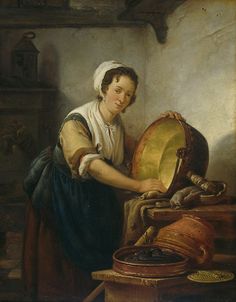 Barbara Duden is a German historian who has studied the work of Dr Johann Storch – a physician working in a German town called Eisenach in the 18th century. He kept detailed clinical notes on his patients and Duden is particularly interested in his work treating female patients.
Barbara Duden is a German historian who has studied the work of Dr Johann Storch – a physician working in a German town called Eisenach in the 18th century. He kept detailed clinical notes on his patients and Duden is particularly interested in his work treating female patients.
Storch’s medical world is that of purges and controlled bleedings and compresses…and yes, leeches.
As Duden states, women’s bodies are conceived in terms of fluxes and flows, a million miles from the biomedical model we have adopted and learnt over the last 150 years or so. In Storch’s world, women go to see the doctor to seek help when they have exhausted their own resources in terms of home-made treatments, advice from friends or just putting up with their state of unwell. I didn’t say “sickness” there because that doesn’t really describe how these women viewed their own bodily dysfunction. Their idea of a state of unwell for themselves was more of a sense of the “flows” being slowed or blocked. Many of this was to do with menstrual flow (as you would imagine).
At no time did any of these women undergo physical examination by the good doctor. Well, not unless they were about to die, actually. Then they might relent and finally give consent to this (in hope of a cure?). In fact, the doctor rarely even touched his patients – societal rules of modesty forbade it.
Many times the doctor never actually saw the patient – again, the status of women in this society (and no doubt low literacy levels) meant that women would often have their husbands or fathers or brothers write to the doctor, explain the symptoms and the doctor would prescribe appropriate treatment or send back compounds for ingestion or application.
As Duden studied the doctor’s writings she struggled to really get in touch with these women through the written word. Story after story of purgatives and laxatives and compresses and powders and bleeding – so far removed from our modern ideas of bodies and medical diagnosis and treatment. As a woman living in the biomedical model in the early 21st century her view of her own body seemed so distant from theirs…and yet she saw her task as really trying to understand their sense of their own bodies.
To achieve this understanding, Duden gradually realises she has to recognise and then abandon her own embodied sense of self and look at their’s.
When she does this, she frees herself from trying to diagnose them in the biomedical paradigm – and begins to really understand what is going on for them.
She concludes that the nature of the care these women seek is closer to a wholistic one than what we call medical care now.
These women are listened to – really listened to by the physician. Their stories and their interpretations of their illness are believed absolutely. And of course these stories or retellings of their story form the foundation of his knowledge of their state of being. He literally has little else to go on!
Duden invites us to reflect on our own model of medical care.
The notion of the deus ex machina is Duden’s description of the nature of 18th century doctoring: the deus ex machina is a device that progresses a theatrical performance when things have stagnated a little in the storyline. Something dramatic or magnificent is introduced (think – a new sports car is purchased by one of the characters on Neighbours) in order to get the show going again.
Where is the physician in this? In the eighteenth century, the physician is the circuit breaker – visiting him and telling him your story of unwell is a pause in proceedings.
He listens, he prescribes or carries out a procedure – something that you both think might help: a bleed, a powder, a compress to be repeated at home.
There is no promise of cure. Only maybe a hope for improvement – from the doctor and the patient?
And a feeling of having been listened to…of having shared your problems.
Many times, the problem is righted. Sometimes not. Many times there is no further contact with the good doctor.
Duden gives an example: a 60+ year old woman who has stopped her menses.
He prescribes a compress – she is cured.
There is no rational reason why she should be cured, or even that she needs a “cure” from what we would probably call menopause. The woman defines the problem, the doctor seeks to treat with the knowledge available to him.
Is there something present in this style of care that we miss out on today?
I’m not advocating for a return to leeches, but how distant are our bodies from our own selves?
How could we benefit from seeing our bodies as systems of fluxes and flows that need restoring to equilibrium rather than “fixing” by biomedicine?